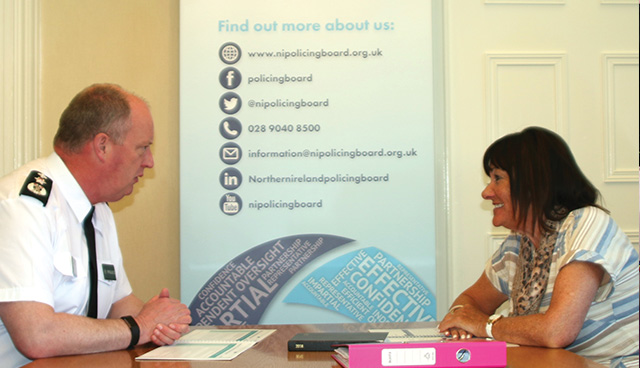PSNI oversight ‘limited’

The appointment of PSNI Deputy Chief Constable Drew Harris as the new Garda Commissioner means that two thirds of the PSNI’s senior management team are temporary officers.
The PSNI has been acting without a fully-functioning oversight body since the collapse of the Assembly in February 2017.
At a recent appearance in front of the Northern Ireland Affairs Select Committee, Chief Constable George Hamilton highlighted that the PSNI would now have six temporary appointments filling nine positions on its senior membership team.
The Policing Board, which is meant to be made up of nine independent members and 10 MLAs, has been unable to carry out any of its statutory duties because the absence of a justice minister, meaning no MLAs can be appointed.
While Hamilton has the power to appoint temporary positions on the senior management team, it is up to the Policing Board, under their statutory duties, to make them permanent.
At the committee, Hamilton also outlined his belief that the current scenario was creating a “vulnerability” around talent retention. He added that the Policing Board offered a “positive platform” through which the PSNI could explain themselves “frankly”.
“The policing board gives us – when it is functioning – a very good public platform to explain ourselves either in the positive or the negative. Defend or explain basically.”
Currently the range of statutory duties which cannot be carried out include public accountability sessions, scrutiny through committee meetings, publication of research reports of the policing plan and a progression of Board and senior officer appointments.
In a statement to agendaNI, the Board’s Chair, Anne Connolly described a “very challenging year” when the Board could not “be constituted and discharge the full range of legislative duties it is responsible for as required by the Police (NI) Act 2000”.
She says: “The prevailing situation has been deeply concerning and frustrating for me as Board Chair. However, I along with independent member colleagues, have focused efforts to keep, as far as practicable, the structures that support oversight and accountability functioning. Duties have been progressed and fulfilled in line with the delegations given by the Board at its last meeting on 27 February 2017.”
Connelly outlines that private meetings have continued to be held with the Chief Constable and senior officers on issues such as resources, recruitment and policing in the community. Adding that reports and information from the PSNI and the NCA have continued to be received and analysed.
Connelly, who has spoken previously about her concerns around the status of the board, recently also gave evidence to the Northern Ireland Select Affairs Committee on the impact the political stalemate is having on board operations and on Northern Ireland in general. A recent report by the committee recommended that the Board be reconstituted and that legislative measures be put in place to prevent any similar occurrence.
She adds: “Oversight and scrutiny of policing remains essential for confidence building in the service. It brings openness and transparency to police decision making, and equally importantly provides a sounding board for the Chief Constable to outline thinking around strategic plans, whether that is in respect of estates or recruitment or finances.
“Policing is changing, as are the demands being faced by the PSNI in day to day service delivery.
“I pay tribute to the Chief Constable and the officers and staff of the PSNI for the professional work that they on a daily basis in keeping people safe.”






